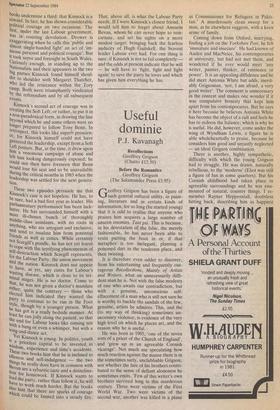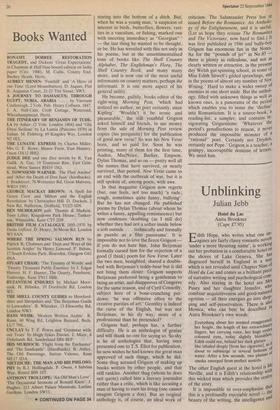Useful dominie
P.J. Kavanagh
Recollections Geoffrey Grigson (Chatto £12.50) Before the Romantics Geoffrey Grigson (The Salamander Press £5.95)
Geoffrey Grigson has been a figure of such general cultural utility, in paint- ing, literature and in certain kinds of information, for so long (he started young) that it is odd to realise that anyone who praises him acquires a large number of unseen enemies. Tant pis. This is because, in his detestation of the false, the merely fashionable, he has never been able to resist putting the boot in or, if that metaphor is too inelegant, planting a poisoned dart in the tenderest place, and then twisting.
It is therefore even odder to discover, from his entertaining and frequently out- rageous Recollections, Mainly of Artists and Writers, what an unnecessarily diffi- dent man he is. Not with the false modesty of one who awaits our contradiction, but with a genuine, unconscious self- effacement of a man who is still not sure he is worthy to buckle the sandals of the few, genuine, artists he admires. This, and the (to my way of thinking) sometimes un- necessary violence, is evidence of the very high level on which he places art, and the reason why he is useful.
He was born in 1905, 'one of the seven sons of a priest of the Church of England', and 'grew up in an agreeable Cornish vicarage'. Not much use speculating how much reaction against the manse there is in the sometimes surly, unclubbable Grigson; nor whether the fate of his brothers contri- buted to the sense of defiant aloneness he sometimes emits. 'Few of this writer's own brothers survived long in this murderous century. Three were victims of the First World War. Two were victims of the second war, another was killed in a plane as Commissioner for Refugees in Pakis- tan.' A murderously clean sweep for a man, as he elsewhere suggests, with a keen sense of family.
Coming down from Oxford, marrying, finding a job on the Yorkshire Post, he felt 'immature and insecure'. He had known of Auden and MacNeice, his contemporaries at university, but had not met them, and wondered if he ever would meet 'any writer, painter, thinker, of eminence or power'. It is an appealing diffidence and he did meet Antonia White but adds, inevit- ably Grigsonian, 'not, I am afraid, a very good writer'. The comment is unnecessary in the context and makes one wonder if it was compulsive honesty that kept him apart from his contemporaries. But he says it here because he believes Antonia White has become the object of a cult and feels he has to redress the balance; which is why he is useful. He did, however, come under the wing of Wyndham Lewis, a figure he is able wholeheartedly to praise, because he considers him good and unjustly neglected — an ideal Grigson combination.
There is another, highly sympathetic, difficulty with which the young Grigson had to struggle. He was drawn, naturally rebellious, to the 'moderns' (Eliot was still a figure of fun in some quarters). But his Cornish childhood had taken place in agreeable surroundings and he was ena- moured of natural, country things. I re- member Rayner Heppenstall, doubtless hitt.ng back, describing him as happiest staring into the bottom of a ditch. But, when he was a young man, 'a suspicion of interest in birds, butterflies, flowers, rari- ties in a vasculum, or fishing, marked one with sneering immediacy as "Georgian" ' — the last thing he wanted to be thought, or be. He has wrestled with this not only in his poems, but in the unsentimentalised tone of books like The Shell Country Alphabet, The Englishman's Flora, The Shell Country Book, and many many more, and is now one of the most useful informants on country matters, perhaps the informant. It is one more aspect of his general utility.
He became, guiltily, books editor of the right-wing Morning Post, 'which had noticed no author, no poet certainly, since Kipling'. 'Wouldn't it be ironic and pleasurable,' the still youthful Grigson asked himself and friends, to use money from the sale of Morning Post review copies (his perquisite) for the publication of good new verse? So was his New Verse born, and so paid for. Soon he was printing, many of them for the first time, Auden, MacNeice, Barker, Empson, Dylan Thomas, and so on — pretty well all the names that have survived, or nearly survived, that period. New Verse came to an end with the outbreak of war, but it is still spoken of, among poets, with awe.
In that magazine Grigson now regrets (but, one feels, not too much) 'a rude, rough, sometimes quite funny, bullying'. But he has not changed. He published poems by Dylan Thomas (about whom he writes a funny, appalling reminiscence) but now confesses 'doubting (as I still do) whether they had not a softer inside below a soft outside . . . technically and formally as puerile as a film panorama'. It is impossible not to love the fierce Grigson if you do not hate him. John Betjeman formally cursed him for the rejection of a good (I think) poem for New Verse. Later the two men, benighted, shared a double- bed with Betjeman's teddy-bear but it did not bring them closer. Grigson suspects Betjeman preferred being a gentleman to being an artist, and disapproves of Congreve for the same reason, and of Cyril Connolly, subject here of a bone-crunching put- down: 'he was offensive often to the creative purities of art.' Gentility is indeed the curse of the English, but was not Betjeman, in his sly way, more of a professional than he pretended?
Grigson had, perhaps has, a further difficulty. He is an anthologist of genius and will thank no one for saying so. So shy is he of anthologies that, having once presented one to T.S. Eliot for publication, he now wishes he had known the great man approved of such things, which he did. Some thug accused Grigson of making up books written by other people, and that still rankles. Another thug (whom he does not quote) called him a literary journalist rather than a critic, which is like accusing a man of having to earn his living (one cannot imagine Grigson a don). But an original anthology is, of course, an ideal work of
criticism. The Salamander Press has re issued Before the Romantics: An Antholo- gy of the Enlightenment, and it is useful. (Let us hope they reissue The Romantics and The Victorians, now hard to find.) It was first published in 1946 and bully-boy Grigson has enormous fun in the Notes. As for the "pounds of jet" in No.85 — there is plenty as ridiculous, and not as clearly written or attractive, in the present day Welsh gut-spinning school, in some of Miss Edith Sitwell's gilded sprawlings, and in the poems of almost any number of New Writing.' Hard to make a wider sweep of enemies in one short aside. But the anthol- ogy, filled with unknown things as well as known ones, is a panorama of the period, which enables you to sense the 'decline into Romanticism. It is a source-book, a reading-list, a sampler, and contains In- vigorating Grigsonisms: 'Whatever the period's genuflections to reason, it never produced the impossible monster of 3 "rational" poet. Certainly not Dryden, certainly not Pope.' Grigson is a teacher, a grumpy, incorruptible dominie of letters. We need him.











































 Previous page
Previous page